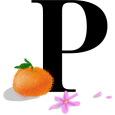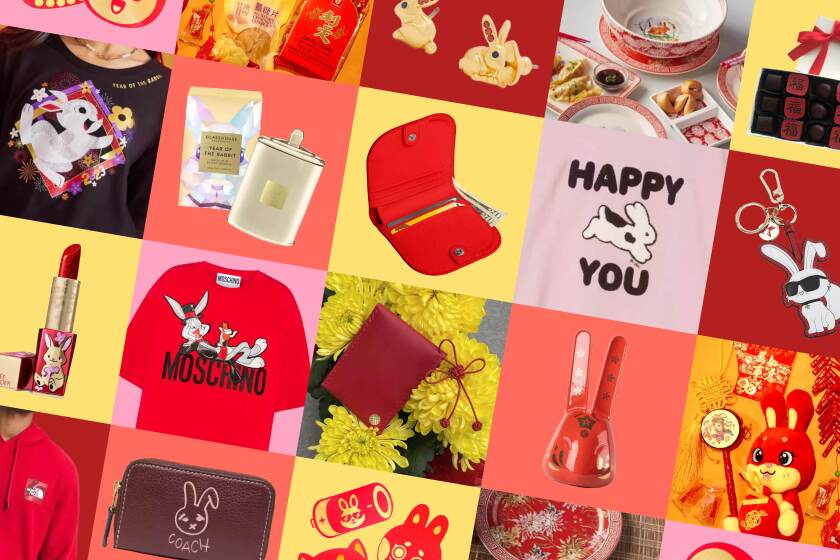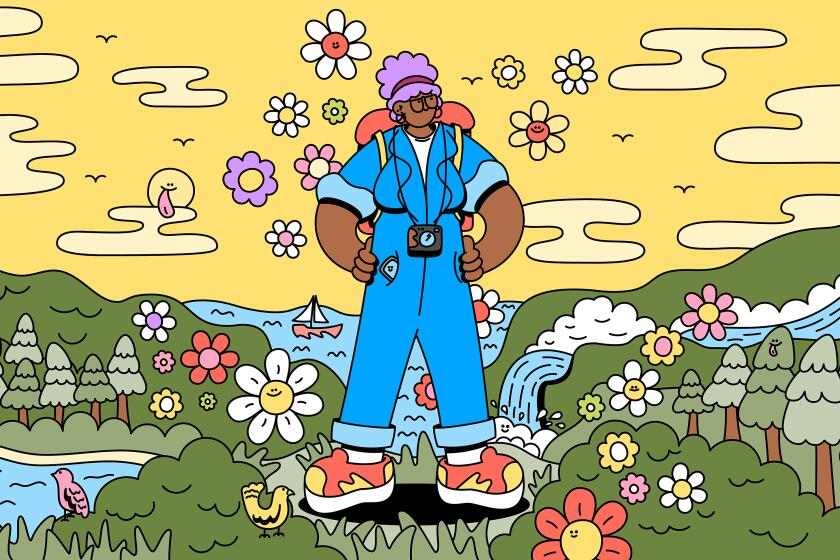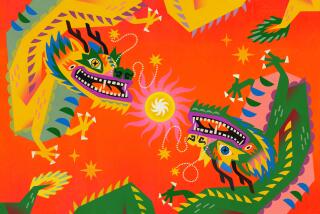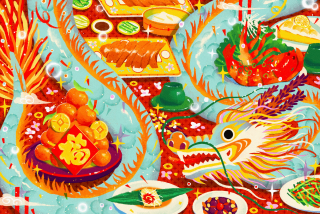Jan. 22 ushers in the Year of the Water Rabbit. Illustrations and animation by Li Anne Liew.
- Share via
People often assume Frankie Huang is a rabbit.
She was born in Beijing in January 1987 — after the start of the Gregorian new year but before the start of the Lunar New Year.
In the Chinese zodiac, rabbits were born in 2011, 1999, 1987, 1975, 1963, 1951 and so on — but after the Lunar New Year, which in 2023 falls on Jan. 22. So Huang, born at the tail end of the Tiger year, has always felt like a “secret tiger.”
Many people think of bunnies as cute, soft and cuddly — something to be protected — said Huang, a writer and illustrator now based in Massachusetts. In Chinese culture, bunnies are often feminized, associated with the Jade Rabbit that lives with the moon goddess and symbolizes selflessness, piety and sacrifice.
Maybe it comes from being an Asian woman and always being underestimated, Huang said, but her whole life, she’s felt like saying: “No, I’m strong and angry, and I will fight you.”
Recently, though, Huang has been rethinking her own stereotypes of the calm and docile rabbit. She’s in her second trimester of pregnancy with a future Year of the Rabbit baby. She’s having a boy.
Kick off the Year of the Rabbit with rabbit-themed gift ideas you may want to get for yourself, including chocolates, clothing, candles, lipstick and more.
The rabbit is the symbol for the #MeToo movement in China, she pointed out. #RiceBunny was coined by Chinese feminist activist Qiqi to avoid censorship. In Mandarin, “me” sounds like “米 (rice),” and “too” sounds like “兔 (bunny).”
She also thinks of the idiom, “狡兔三窟 (the crafty rabbit has three burrows),” referring to a rabbit’s vigilance and resourcefulness, as well as the last section from “Ballad of Mulan” — “雄兔腳撲朔,雌兔眼迷離。雙兔傍地走, 安能辨我是雄雌?(The buck bounds here and there, Whilst the doe has narrow eyes. But when the two rabbits run side by side, How can you tell the female from the male?)”
In the U.S., we look to Jan. 1 as the start of the new year, but in Asian cultures, the multiweek celebration of Lunar New Year is another chance to put the past behind us and usher in new possibilities. And the zodiac can serve as a compass for where things may be heading. What will the Year of the Rabbit bring in 2023?
Perhaps some clues can be found at the world’s largest collection of rabbit-related items: the Bunny Museum in Altadena.
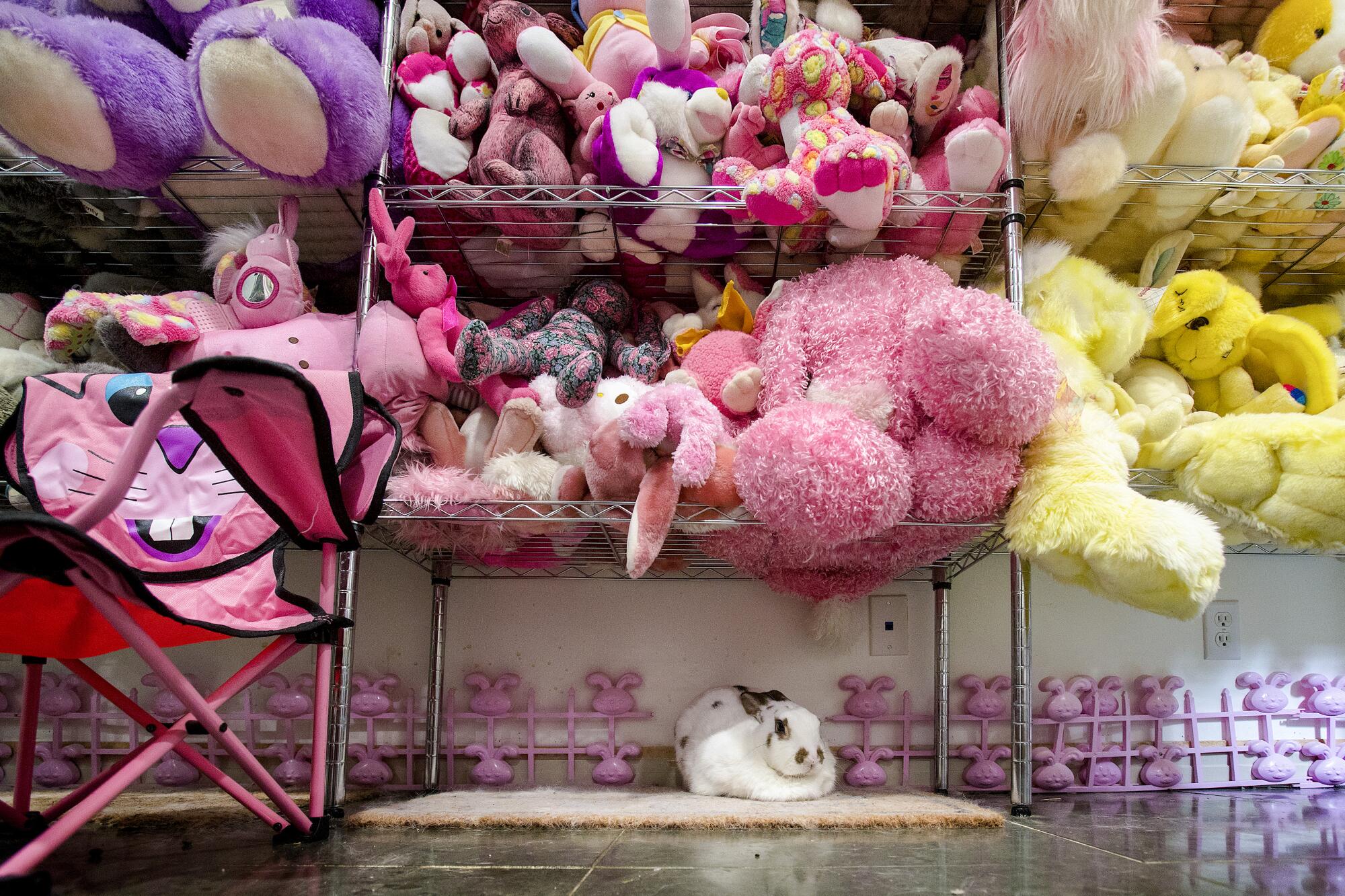
Museum co-founder Candace Frazee said more than half of the visitors to the Bunny Museum are Asian, many coming from abroad because they are born in rabbit years. 2023 will be a double celebration, because it’s not only the Year of the Rabbit but also the museum’s 25th anniversary.
According to Frazee, Huang’s suspicions about rabbits are correct — in nature, they’re hardly meek creatures. Rabbits are prey animals, Frazee explained, which means they’re always trying to avoid being eaten. They’re swift and their instinct is to flee. They throw things around if they don’t like them in their area, and they fight. “Fur does fly,” she said.
But the zodiac rabbit is known for peace, diplomacy and luck, said Laura Lau, the co-author of “The Handbook of Chinese Horoscopes.”
A person born in a particular year takes on the traits of that year’s animal, according to superstition. And each individual year — and how various animals experience that year — will be affected by those characteristics as well.
“The rabbit is about making things nice,” said Lau. “That doesn’t mean that the rabbit year doesn’t have drama underneath, but it’s kind of like, ‘Let’s be polite. Let’s maintain etiquette. Let’s move forward. Let’s have more productivity.’”
Celebrate Lunar New Year in SoCal
Our reporters will be taking the L.A. Times “Ask a Reporter” stand to two Lunar New Year festivals in Southern California. Come by and say hello. Here’s when we’ll be there:
Lunar New Year Festival
When: Jan. 22
Where: Garvey Avenue, between Garfield and Alhambra avenues, Monterey Park
Cost: Free
UVSA Tết Festival
When: Jan. 28
Where: The OC Fair & Event Center, 88 Fair Drive, Costa Mesa
Cost: Admission is $8
Each year also has an element, and this year is the water rabbit. Water in general makes the animal more meditative, emotional and empathetic, Lau explains. Last year, the water toned down the fierceness of the Tiger, while this year, the water makes the rabbit more introspective and sensitive.
This may come as a relief to those who have felt the effects of the Year of the Tiger, which is known for bringing a lot of passion and change, but also unpredictability and explosiveness.
Desmond Chiam, an actor best known for his role as the super-soldier Dovich from “The Falcon and the Winter Soldier” (who is also a rabbit), said he aspires to be gentle.
His Singaporean parents said when Chiam was a kid growing up in Australia, he was very gentle and quiet. That was a point of pride for his parents, he said, who also told him that their family tried to have as many rabbits as possible to keep family peace.
He has a few other cousins and aunts who are rabbits. “Rabbits have taken over,” he said. “And we do have a relatively peaceful family.”
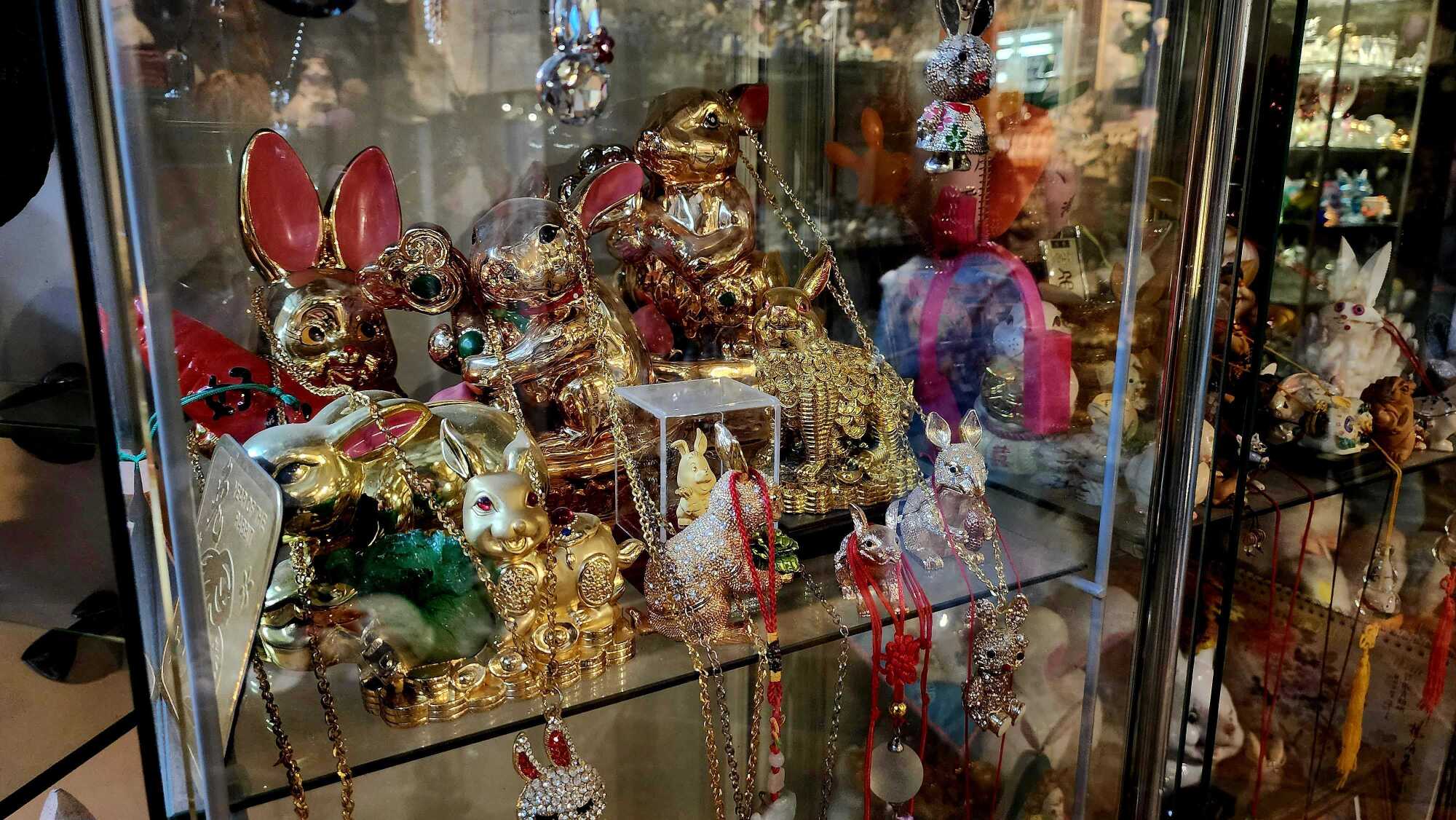
OiYan Poon, a race and education researcher who’s writing a forthcoming book — a collection of letters to her 7-year-old daughter about what it means to be Asian in America — said she was always proud to be a rabbit. As a kid, she’d read her horoscope on those ubiquitous Chinese restaurant placemats and think, “Yes, I am quick-witted. Yes, I am a natural-born leader.”
Poon considers the zodiac as a “fun thing where it kind of becomes a joke.” But sometimes it’s true. For example, animals across from each other on the zodiac wheel — rabbits and roosters, for example — aren’t supposed to get along. And she and her younger brother, a rooster, did not get along when they were growing up, she said.
Lau explained that roosters are supposed to be inflexible — her brother is so inflexible, Poon affirmed, laughing — and therefore will have a harder time this rabbit year, along with impulsive tigers and horses. The animals that will be able to adjust more easily to the rabbit’s more diplomatic, less direct communication style are the sheep, the dog and the boar.
Interestingly, 2023 also is an uncommon year where the Chinese and Vietnamese animals differ. In the Vietnamese zodiac, the Year of the Rabbit, fourth in the zodiac cycle, is replaced by the Year of the Cat.
Get inspired to experiment in big ways and small
Why are there two different animals this year?
The story behind the Chinese zodiac starts with a race organized by the Jade Emperor. As the tale goes, animals competed to be part of the top 12, and the winners of the race determined the order of the zodiac.
But a lot of folklore diverges depending on where it travels, said Charles Liu, who co-founded Irvine’s A Little Dynasty Chinese School. Even now, the school’s teachers still teach the kids Lunar New Year stories, but the details of them depend on who’s teaching it.
Lau said that some Chinese zodiac experts — including her late mother, who published the first edition of “The Handbook of Chinese Horoscopes” in 1979 — see the cat as represented in the Tiger year. But in one popular Chinese rendition of the story, the rat and the cat were best friends who plan to compete together, said Liu. On the morning of, however, the rat sneaks off without the cat. The rat wins, while the cat oversleeps and misses the whole race. This betrayal explains not only why the cat is not on the zodiac but also why cats hate mice.
There are multiple explanations for why the Vietnamese zodiac has a cat, said Quyen Di Chuc Bui. He’s a Vietnamese language lecturer at UCLA who went viral in 2019 when a student posted a video of him handing out stuffed animals in class to reward students for their hard work.
Many believe it may have evolved from a confusion in pronunciation, because the word for rabbit in Old Chinese, 卯, is pronounced “mao,” similar to the sound “mèo” in Vietnamese. Chuc Bui said it might also be because ancient Vietnamese people who originally lived in the lowlands preferred a more domestic animal like the cat over a wild animal like the rabbit.
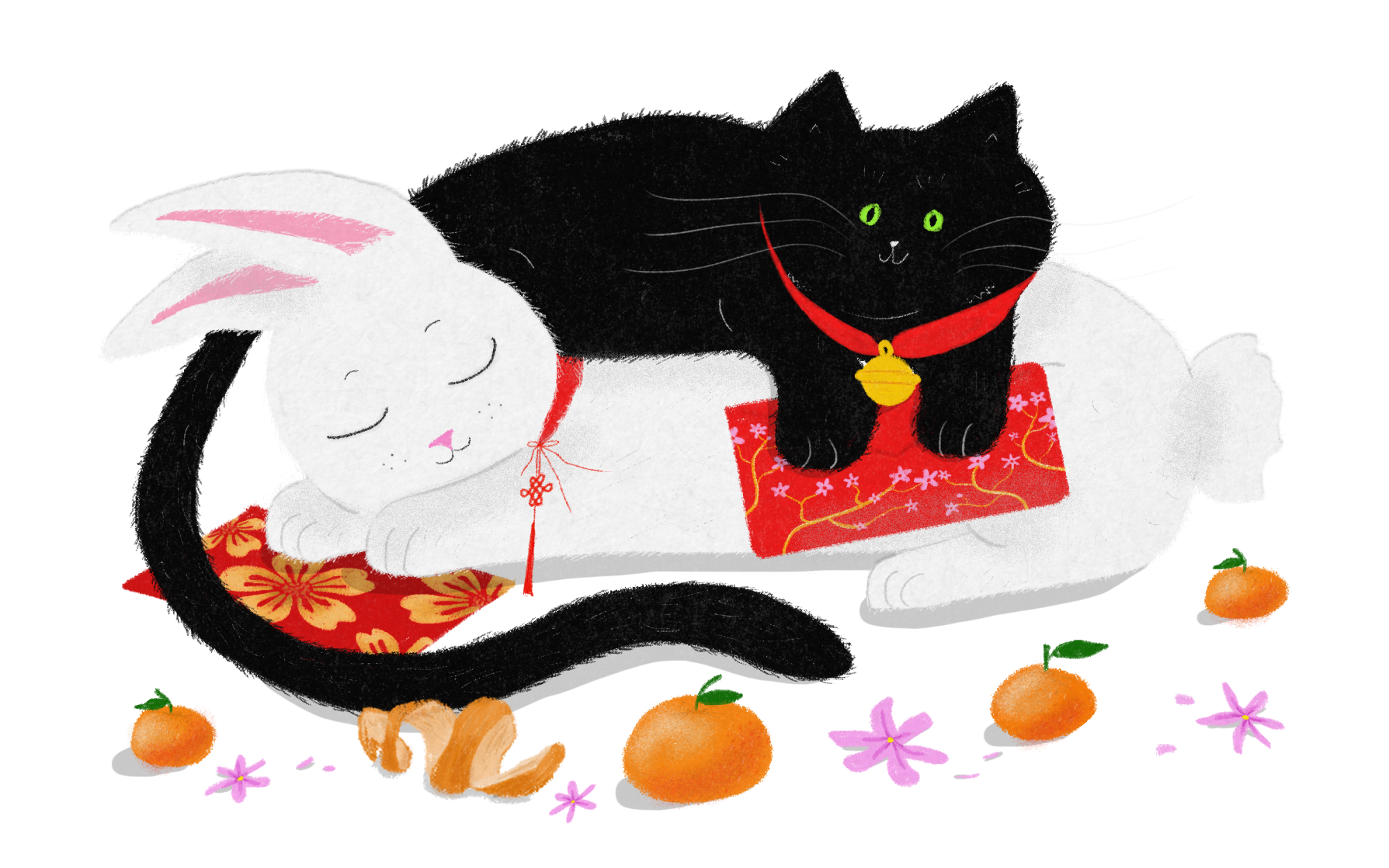
Emmerick Doan, one of the organizers of the UVSA Tet Festival, which takes place from Jan. 27 to Jan. 29 at the OC Fair & Event Center in Costa Mesa, said there’s another theory that Vietnamese farmers often dealt with rats invading their crops, so they developed a special affinity for the cats that would kill the rats.
For the purposes of astrology, rabbits and cats share similar characteristics.
“From what I know, cats are really ambitious,” said Doan. “They’re really agile, and there’s a duality to them, where they’re sensitive but there’s also a lot of tenacity.”
Rabbits know how to enjoy life, said Lau — and enjoying life is definitely something cats also like to do, said Mye Hoang, the director of “Cat Daddies,” a documentary that follows nine men whose lives have been forever changed by their love of cats. Her older sister Dian Hoang always says that if she were reincarnated, she’d want to come back as one of Mye’s cats.
Mye Hoang has been traveling to film festivals with the film — most recently visiting cat cafes in Japan — but she didn’t realize 2023 was the Year of the Cat until Dian called her from Dallas, insisting on ordering Year of the Cat red envelopes to give out during Mye’s Lunar New Year screenings.
“You’d think that I, out of everyone — the person who made a cat documentary and is Vietnamese American — would have known this,” Mye said.
Dian Hoang, who lived in Saigon until she was a teenager, always helped their late father pack the new year red envelopes. This year, she went to four separate banks to gather crisp bills to fill 18 envelopes with one $5 bill, a $2 bill and two $1 bills. The number 9, in addition to symbolizing a cat’s nine lives, is a lucky number in Vietnamese culture, Dian Hoang explained.
On Jan. 22, Mye will be screening the film in Tucson, Ariz. — coincidentally, the hometown of her husband, Dave Boyle, who partly inspired the film — and handing out lucky cat envelopes to those who ask questions during the Q&A.
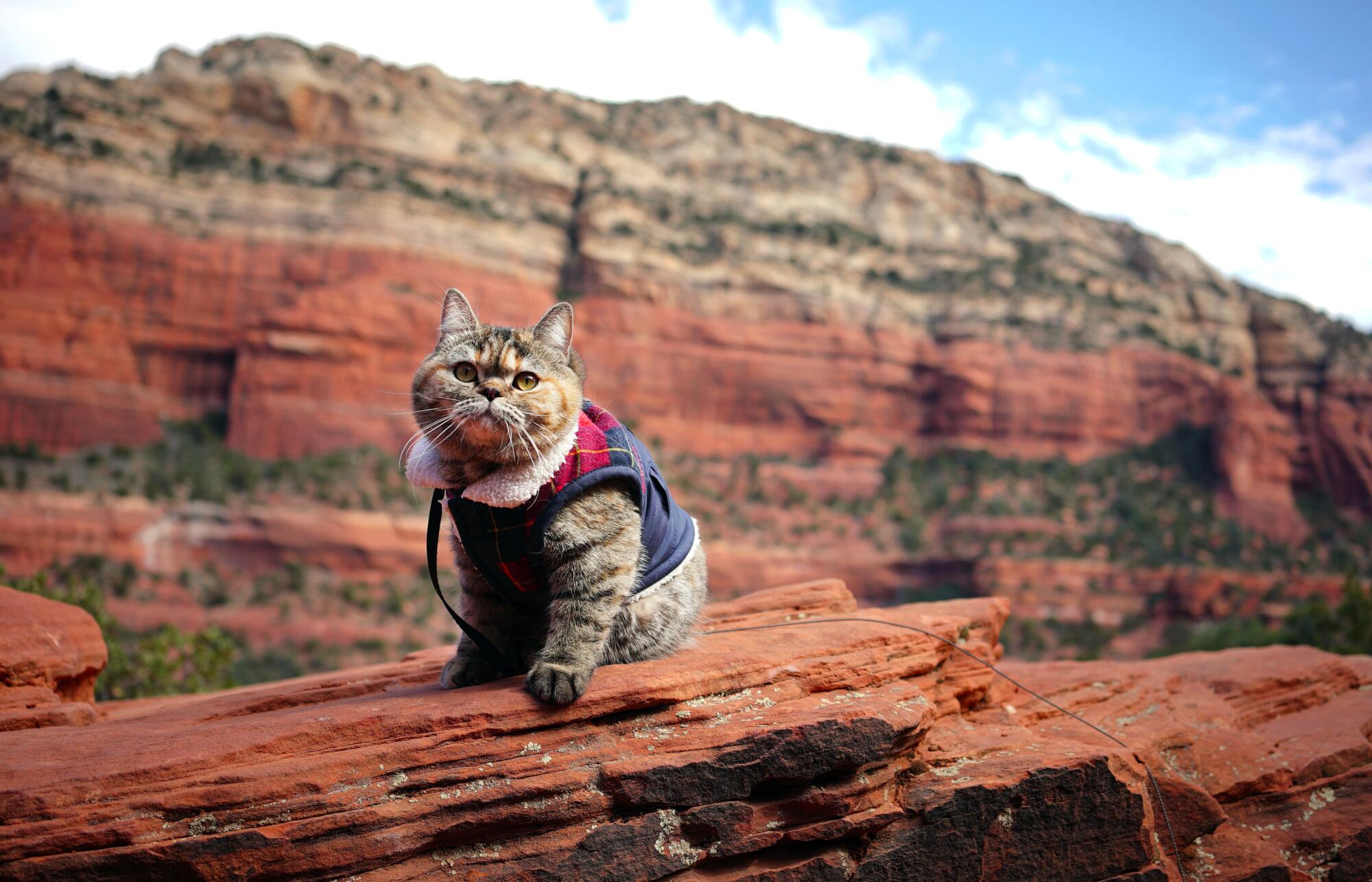
Will we have a year of peace?
People are often more familiar with the Jade Rabbit, but there is a lesser-known Rabbit God called the 兔兒神 — which the poet Chen Chen uses as his Twitter display name.
Chen figures that most people who can’t read Chinese probably assume it’s his actual name. But the Rabbit God has special meaning to him.
He first learned about the patron god of queer love from a short film by Andrew Thomas Huang, “Kiss of the Rabbit God.” It surprised Chen that this deity was from Fujian, his home province. There’s a shrine in Taiwan dedicated to the Rabbit God, and queer Chinese couples make pilgrimages there to receive blessings, he said.
You could say this knowledge gave some peace to a young man trying to reconcile his Chinese American and queer identities. He’s writing about this in his debut book of essays, “In Cahoots With the Rabbit God,” scheduled for release in 2023.
Some famous Rabbits
2011
Ryan Kaji (Ryan’s World)
1999
Lil Nas X
Megan Suri
Aramis Knight
1987
Katie Leung
Henry Golding
Manny Jacinto
Michael B. Jordan
Jimmy O. Yang
Lee Min-ho
Daniel Scheinert
Daniel Kwan (February 1988)
1975
Zadie Smith
Drew Barrymore
Angelina Jolie
Ta-Nehisi Coates
Charlize Theron
Eva Longoria
Taika Waititi
1963
Jet Li
Michael Jordan
Michelle Obama (January 1964)
1951
Mark Hamill
Sting
1939
Margaret Atwood
Ian McKellen
Tina Turner
Victor Narro, the project director for the UCLA Labor Center born in 1963, relates to both his cat and rabbit zodiac signs. He teaches a popular spirituality, mindfulness and self-compassion class that focuses on healing.
“Activists and social justice workers are constantly burning out emotionally, physically and mentally, and then you struggle with finding a sense of purpose,” he said. He wanted to create a space to talk about how to deal with anger, have courageous conversation and be kind.
He thinks we especially need some peace coming out of a chaotic year.
Cats in Vietnamese culture also are thought to bring luck and peace of mind, said Chuc Bui.
Though he doesn’t believe in the zodiac superstitions, many in the Vietnamese community take them very seriously, he said.
Tra-my Le, from Garden Grove, is nervous about 2023. She says that rabbits born in the summer of 1975 face more challenges in relationships than those born in the spring or fall that year. She’s still reeling after two divorces. But through the Vietnamese psychic readers she follows on YouTube, she’s learned it’s most important for her to focus on her health this year.
Soowon Lee, a rabbit based in Rancho Palos Verdes, said her Korean mother always told her she holds an excessive amount of fire, according to her astrology chart. She was told to be careful with her health, otherwise she’d have a heart attack by 50. She also was told that if she and her first husband stayed together, he would die before her. The marriage lasted only a couple of years.
The Chinese zodiac can be pretty blunt, said Chiam.
“I remember reading some of the horoscopes in my aunt’s apartment, and some of them are like, ‘Your year is gonna be filled with death.’ There are no mitigating factors. Just get ready for a bad year.”
It can be hard not to believe when you see other predictions come true, Lee admits. But now, when she hears astrological advice, she tries to take the good stuff and let the bad stuff go.
But Lau argues that all of these characteristics and elements in the Chinese zodiac do have both positives and negatives. For example, rabbits know how to enjoy life, which is good, she said, but when the focus on individual happiness gets too extreme, you start to see community break down.
Rabbits also are known for being polite, but the opposite side of diplomacy is that there is going to be a temptation to ghost people this year, she warned. “Rabbits tend to disappear,” she said. “When things get too messy or painful, they don’t show up. ... And that doesn’t make things better. Plus, it’s irritating.”
Whether someone has a good or bad year is always personal and subjective, Lau said.
Huang agrees that astrology, whether it’s the constellations of the Western zodiac or the animals of the Chinese one, is just another way of thinking about life, symbols and relationships.
And it’s fun. “In Beijing, especially, you can buy these clay figurines of a rabbit in full military regalia, with a plume hat and everything,” she said. “I’m trying to buy one, because I think it’s really cute, and I want to put it in the nursery.”
One of the most popular renditions of this toy, she realized, is the rabbit deity riding a tiger. For Huang, it’s an image that feels incredibly fitting.
More to Read
Sign up for The Wild
We’ll help you find the best places to hike, bike and run, as well as the perfect silent spots for meditation and yoga.
You may occasionally receive promotional content from the Los Angeles Times.
